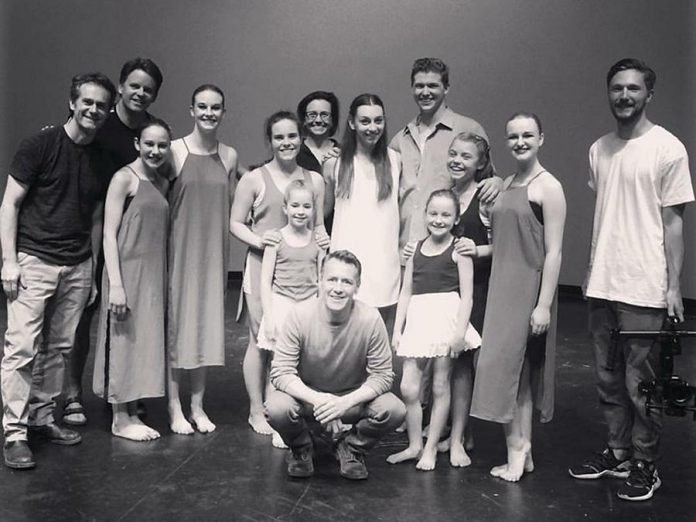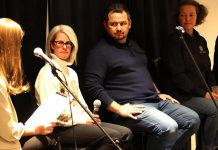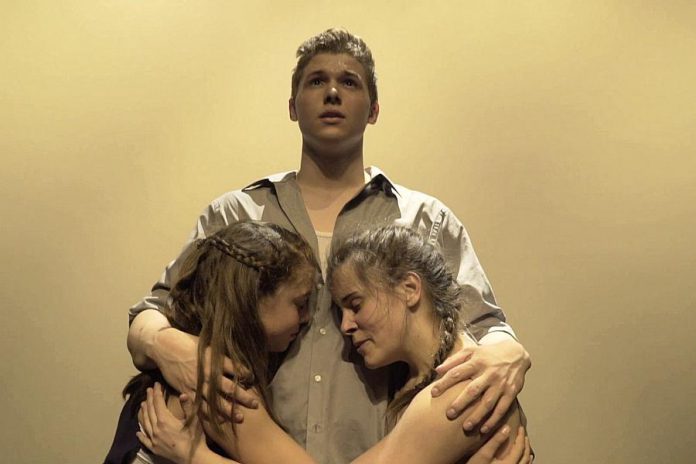
Four months after the death of his wife Angela in 2014, local writer Frank Flynn had a near-death experience when his heart stopped beating.
“I had what they call a cardiac pause,” Frank recalls. “Basically your heart stops. Losing my wife to suicide literally broke my heart.”
If it wasn’t for the efforts of his two daughters, who were only young teenagers at the time, Frank wouldn’t have been able to tell the journey his family has taken, which became the subject of Flynn’s 2016 short film Surfacing.
Produced by local arts group Art for Awareness and directed and scored by Blake Edwards, with choreography by Rachel Bemrose, Surfacing made its debut at the 2017 ReFrame Film Festival and is now available for online viewing (see video below).
Surfacing tells the journey of Angela, Frank, and their two daughters through poetry and dance, taking the viewer through an emotional story of love, illness, sorrow, death, grief and recovery. It tells of Angela’s battle with a crippling mental illness, her life with Frank and their daughters, and her eventual suicide in 2014.
It also features Frank’s near-death experience, as well as Frank and his daughters’ grief and recovery following Angela’s death. While the primary themes are suicide and mental illness, at its core Surfacing is a story about the strength of a family’s love and how, even in the face of tragedy, this love can heal deep wounds.
VIDEO: Surfacing (2016)
“Watching my wife’s mental health disintegrate over an extended period of time was incredibly painful,” Frank says. “We were grieving my wife’s passing, and then I had this cardiac event. Everything was a total disaster. After her loss and trying to parent my kids while also trying to reconstruct my life, I felt like something beautiful had to happen. I don’t know what … but something beautiful had to happen.”
Well known as a writer and playwright, it seemed the obvious thing to do was for Frank to write about it. However, this was something Frank struggled with.
“People asked me if I was going to write a play or some prose about it,” he recalls. “I thought about that but I just couldn’t do it. The pain I was in was beyond words. I just didn’t have the words to tell that story.”
“I thought that the pain that I and my kids were in was cellular; it was in our bodies. So I thought about how to express that, and I realized that it had to be told with bodies in motion. Instead of telling it outwards, it should be told in dance.”
After seeing a dance performance created by Rachel Bemrose and Blake Edwards at one of Public Energy’s Dusk Dances in 2016, Frank approached them about turning his family’s story into a dance piece.
“Rachel and Blake had done a piece called Eau (Water) and it was beautiful and I thought it would be amazing to work with them. I approached them and told them my story, and said I wanted to tell the story with dancers. They said let’s try this. So I said I would write something and give them.”
“I had no idea what I was going to write. I just sat down and put something on paper and I didn’t over-think it. I just decided to tell the story by using words that dancers could interpret, or that a composer could put into music.”
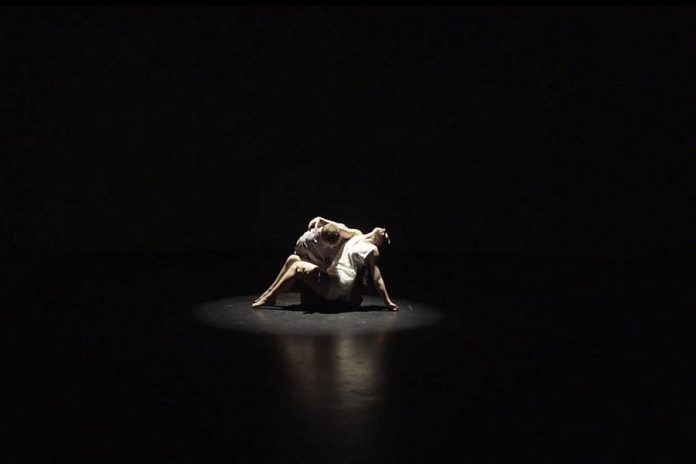
While Frank narrates the film, that wasn’t part of his original vision.
“Blake asked me to come to his house and record the text,” Frank says. “I asked him what the point was and he said ‘I want to hear your voice saying these words while I compose the music.’ So I went to his house and recorded myself saying the text and I left it with him.”
“A month later and said ‘I’m going to send you an audio file but I don’t want you to make any judgments about it. I want you to hear it and then we will talk about it.’ When I opened the audio file, Blake had created the music around my vocal track, which was not what I had intended.”
“I must admit I had major reservations. So when Blake and Rachel and I sat down, I said ‘I’m not comfortable with the text as part of the soundtrack.’ Rachel said ‘Not everybody gets dance … if you include the text as the voice narration it’ll help people who don’t understand dance get into it and follow the story.'”
After thinking about it, Frank agreed and proposed getting an actor to read the text.
“Blake said ‘Why would we get an actor when we have the original? That makes no sense at all.’ Well, he had me there. So with a great deal of reluctance I agreed to have my voice and the text be part of the piece.”
Preparation for Surfacing began in 2016 as a live performance piece but, while casting the show, the concept changed once again and it was decided they would turn the performance into a short film.
“When we started the casting and rehearsal it became apparent we weren’t going to get those dancers in the same place at the same time for a live performance,” Frank explains. “So Blake said ‘Why don’t we just film it?'”
“I’d go to rehearsals with the dancers and I have to say it was the most satisfying creative experiences I ever had. To get on the floor with dancers and walk them through the story, and to tell them what I was going through, what my wife was going through, and what my kids were going through, and to talk to the performers that were going to portray us was amazing.”
“It made me feel great. It made me feel like the beautiful thing I wanted was happening.”
The debut of Surfacing at the 2017 ReFrame Film Festival revealed a different type of challenge for Frank.
“Watching it with an audience at ReFrame was intense and, quite frankly, very uncomfortable,” Frank admits. “It’s really difficult subject matter, and it puts an audience in an awkward place. We don’t know how to talk about mental illness or suicide, and we certainly don’t know how to talk to it with people who have experienced it.”
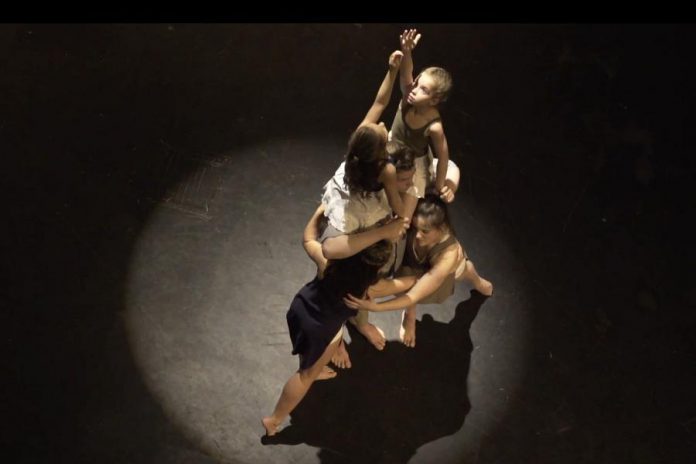
“At the premiere, there was a very strange response from the audience afterwards. On the one hand, it doesn’t seem appropriate to say ‘I loved it, I really enjoyed that!’ It’s not a comedy. But on the other hand, people don’t want to say ‘Oh my god, that was depressing!’ People just don’t know what to say.”
“I did not realize how deep the problem of language is on the subject of mental illness and suicide until this film came out. It’s a real challenge for people to put words to it. But we have to have a starting point and a place to have a conversation. What does it mean to you and what does it mean to me? It’s difficult and it’s hard, but it’s necessary.”
Surfacing can now find a new audience on the internet, where it can reach far beyond the Peterborough community. Two years after its debut at ReFrame, the film continues to be a powerful piece. Despite the difficult subject matter, it’s presented with beauty and dignity.
“I find it hard to look at the film and be objective about it because it’s my own story,” Frank reflects. “One of the things I wanted to achieve was to talk about suicide in an honest way and to give people insight into how mental illness affects families and marriages and kids, as well as the broader community … and to do it in a way that is sensitive and honours, in this case, my wife.”
“I also wanted to deal with the devastation that is left after a suicide. The challenge is how to fuse those two tasks: to be truthful and honest, and to show what suicide is, what it does, and how it affects the people left behind, but do it in a way that still honours the deceased person — to do it in a way that represents that person’s life, and all of their joys and their sorrows, and everything in between.”
You can watch Surfacing online at www.youtube.com/watch?v=1zxLOd_CuoM.
“I hope that some people who have experienced suicide might see this and realize that you can recover from it,” says Frank. “I don’t think you move on, because it’s always with you, but you can move forward. You just live with it in a different way.”
